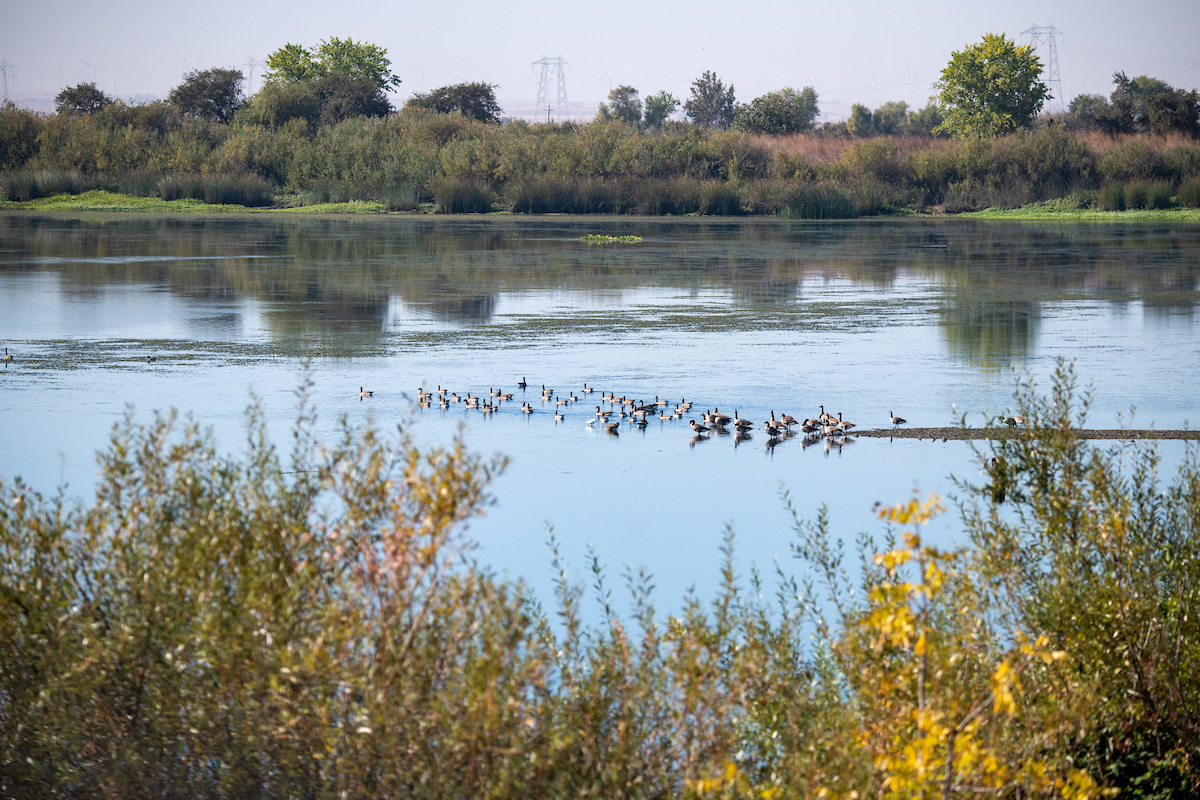Guest Commentary by Dan Ray, in response to yesterday’s guest commentary on the Lookout Slough restoration project:
 Outdoor recreation is among the Sacramento-San Joaquin River Delta’s pleasures. Leisure time spent there can reward recreationists with not just a stringer of striped bass, a brace of waterfowl, or a basket of pears, but refreshed reconnections with nature, family, and a culture that extends back to California’s origins. Each visitor may become an ambassador for the Delta, promoting its charms to neighbors and colleagues and championing its resources’ protection and restoration.
Outdoor recreation is among the Sacramento-San Joaquin River Delta’s pleasures. Leisure time spent there can reward recreationists with not just a stringer of striped bass, a brace of waterfowl, or a basket of pears, but refreshed reconnections with nature, family, and a culture that extends back to California’s origins. Each visitor may become an ambassador for the Delta, promoting its charms to neighbors and colleagues and championing its resources’ protection and restoration.
Recreation in the Delta is also important to the region’s economy. The state’s Delta Protection Commission has found that residents and visitors recreate in the Delta every day, generating a total of roughly 12 million visitor days of use annually and a direct economic impact of more than $200 million in spending annually by businesses big and small. Especially for small businesses, every visitor counts as they struggle to recover from the pandemic and compete with other destinations.
It is because recreation is so important to the Delta that the proposal in the state Department of Water Resources’ (DWR) Lookout Slough habitat restoration project to close the only road into the state’s Liberty Island Ecological Reserve and to provide no compensating recreation improvements has caused such controversy before the Delta Stewardship Council. Californians’ rights to access the area’s public waters are protected in our state constitution. A state agency attempting to block use of similar waters on the coast or in San Francisco Bay would draw swift condemnation, not excuses. In the Delta, protecting recreation as the state pursues ecosystem restoration and a more reliable water supply is a requirement of the Delta Reform Act, which established that a fundamental goal for managing the Delta is to maximize recreation opportunities. That is why the state’s Delta Plan advises agencies proposing ecosystem restoration, flood control, or water supply projects to provide recreation opportunities at new habitat areas whenever feasible and requires that adverse effects to recreation uses be avoided or mitigated.
As the hearings before the Delta Stewardship Council are revealing, DWR has ignored these responsibilities in its Lookout Slough restoration project. In developing the project, DWR consultants and scientists spent hundreds of hours collecting data on use of the site by fish, turtles, bats, and other wildlife, but apparently not a minute gathering information about recreation use at the site. None of the project’s twenty alternative designs was intended to avoid harming recreation at the area. Nor were recreationists invited to join the flood control and habitat interests who reviewed those designs. The public involvement in reviewing the project’s EIR failed to reach the many anglers, hunters, and others who use the area, and when they attempted to provide input as the project was being finalized, they were told to stop being so bothersome, according to testimony before the Stewardship Council.
The frustration of habitat planners, realtors, water engineers and others who proposed the Lookout Slough project is easy to understand. The Delta is a complicated place, with many users – outdoor recreationists, farmers, and local businesses as well as fish, wildlife, and water agencies, all of whose views need consideration. Delta small businesses, reclamation districts, and farmers must make their way through the same complex maze. Project proponents have only themselves to blame for failing to heed concerns about recreation earlier and for the effectiveness of recreationists’ appeals to protect their use of Liberty Island.
The Lookout Slough project will establish an important precedent about how the Delta Reform Act’s protections for recreation and other Delta values are implemented. The site lies at the heart of almost 15 square miles of public land set aside for ecosystem restoration. Over $9 million in taxpayer funds were spent to acquire Liberty Island to which DWR now seeks to block access. Rather than close the only public road access to this well-loved landscape, the Lookout Slough project could be a truly multipurpose anchor to the area, providing recreation for Delta visitors and residents as well habitat and flood control,
The Delta Reform Act was intended to establish a new way of making decisions in the Delta that integrates the needs of ecosystem restoration, water supply, and the Delta as a unique place. Delta visitors and residents should not be expected to stand silently aside as final decisions about key Delta values are made. Nor is the Delta Stewardship Council’s job to rubber stamp the decisions of the same agencies that have created the current crisis in the Delta. Rather, DWR should accept the shortcomings identified by the Stewardship Council’s review of its project, revise its habitat plan to avoid harming recreation in the area, and vow to do better the next time.
Dan Ray is the Delta Stewardship Council’s retired chief deputy executive officer and California State Park’s former chief of planning. He sometimes consults for the Delta Protection Commission, but the views stated here are solely his own.
The seven-member Council has the final say at hearings on July 15 and 16.
View/download draft determination below. More documents available here.
Proposed Determination C20215 Lookout SloughDELTA COUNCIL: Consistency Determination for Lookout Slough Project appealed



